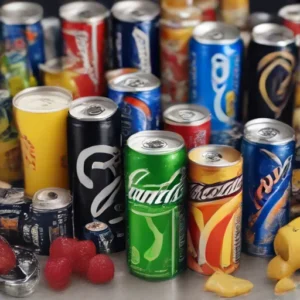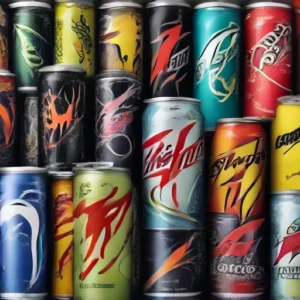When I reach for an energy drink, I often think about that instant boost of energy and alertness it promises. However, it’s crucial to understand the potential side effects that come with these popular beverages. Let’s explore the 10 major side effects of energy drinks on our body.
What Are Energy Drinks?
Energy drinks are beverages designed to give you a quick boost of energy and mental alertness. They typically contain high levels of caffeine, sugar, and other ingredients like taurine, vitamins, and herbal extracts.
The Immediate Boost: What’s Inside?
- Caffeine: Most energy drinks contain about 80-200 mg of caffeine per serving, comparable to one to two cups of coffee.
- Sugar: A single can often has 27-31 grams of sugar, which is around 7-8 teaspoons.
- Other Ingredients: Taurine, B vitamins, ginseng, and guarana are common additions aimed at enhancing energy levels and focus.
The 10 Side Effects of Energy Drinks

Energy drinks have become a popular choice for many seeking a quick boost of energy, but their consumption is not without risks. Here, we detail ten side effects of energy beverages. Also explore that Do Energy Drinks Break Fast?
1. Increased Heart Rate
Energy drinks often contain high levels of caffeine, which can lead to a significant increase in heart rate. Studies have shown that consuming these drinks can cause palpitations and arrhythmias, particularly in individuals with pre-existing heart conditions.
2. High Blood Pressure
The caffeine and other stimulants found in energy drinks can also lead to elevated blood pressure. According to research, even moderate consumption can raise systolic and diastolic blood pressure, posing risks for those with hypertension.
3. Sleep Disturbances
One of the most common side effects of energy drinks is sleep disturbances. The high caffeine content can disrupt normal sleep patterns, leading to insomnia and reduced sleep quality, which can affect overall health and well-being.
4. Dehydration
Energy drinks can contribute to dehydration, particularly when consumed in large quantities or during physical activity. The diuretic effect of caffeine causes increased urination, which can lead to the loss of essential fluids and electrolytes.
5. Anxiety
The stimulants in energy drinks can exacerbate anxiety symptoms. Research indicates that high caffeine intake can increase anxiety levels, leading to nervousness, restlessness, and even panic attacks in susceptible individuals.
6. Digestive Problems
Energy drinks can cause gastrointestinal distress, including stomach upset, nausea, and acid reflux. The high acidity and caffeine content can irritate the stomach lining and exacerbate pre-existing digestive conditions.
7. Weight Gain
Many energy drinks contain significant amounts of sugar, which can contribute to weight gain and increase the risk of obesity. The added calories from these sugary beverages can accumulate, particularly when consumed regularly.
8. Headaches
Frequent consumption of energy drinks can lead to headaches, often due to caffeine withdrawal or overconsumption. The fluctuating levels of caffeine can cause rebound headaches, which are particularly problematic for habitual users.
9. Addiction
The addictive potential of energy drinks is a growing concern. The stimulating effects of caffeine can lead to dependence, with individuals requiring higher doses to achieve the same energy boost, resulting in a cycle of addiction.
10. Cardiovascular Issues
Severe cardiovascular issues, including heart attacks and strokes, have been associated with energy drink consumption, particularly in combination with alcohol or strenuous physical activity. Case studies have documented instances where energy drinks contributed to life-threatening cardiac events.
Long term side effects of energy drinks

Here are the top 5 long term side effects of energy beverages. Also explore that How Much Caffeine is in Bucked Up Energy Drink?
1. Increased Anxiety and Dependence
Energy drinks contain high levels of caffeine and sugar. Over time, regular consumption can lead to increased anxiety. Studies show that consuming more than 400 mg of caffeine per day (about 4-5 energy drinks) can cause nervousness, restlessness, and a rapid heart rate.
Dependence is another issue. Just like any other stimulant, you can become reliant on energy drinks to get through the day, leading to a cycle where you need more to achieve the same effect.
2. Sleep Problems
Caffeine is a powerful stimulant that can interfere with your sleep patterns. Regularly consuming energy drinks, especially in the afternoon or evening, can make it difficult to fall asleep.
Lack of sleep affects your mood, cognitive function, and overall health. Research indicates that poor sleep from high caffeine intake is linked to various health issues, including obesity, diabetes, and depression.
3. Cardiovascular Issues
Energy drinks can have a significant impact on your heart health. They often contain not only caffeine but also other stimulants and sugars that can increase blood pressure and heart rate.
A study published in the Journal of the American Heart Association found that consuming energy drinks could lead to an increase in blood pressure and potentially dangerous changes in heart rhythm. This can be particularly concerning for individuals with pre-existing heart conditions.
4. Dental Problems
The high sugar content in many energy drinks poses a serious risk to dental health. Eating it often can cause tooth decay and cavities. The acids in these drinks can erode tooth enamel, making your teeth more susceptible to decay.
According to the American Dental Association, regular consumption of sugary beverages is one of the leading causes of tooth decay, which can lead to more severe dental issues over time.
5. Bone Health Issues
There is evidence suggesting that high caffeine intake from energy drinks can negatively affect bone health. Caffeine can make it harder for your body to absorb calcium, which is important for keeping bones strong.
This is particularly concerning for young adults and teenagers who are still developing their bone mass. A study in the Journal of Clinical Endocrinology & Metabolism highlighted that excessive caffeine consumption can lead to a decrease in bone mineral density, increasing the risk of osteoporosis and fractures later in life.
Also explore the 15 Long-Term Side Effects of Energy Drinks
Side effects of Energy drinks on the Brain

Here are the top 5 side effects of energy beverages on the brain. Also explore the 15 Side Effects of Energy Drinks on the Brain.
1. Anxiety and Insomnia
Energy drinks usually have a lot of caffeine and other stimulants. When we consume too much caffeine, it can lead to increased anxiety and difficulty sleeping. Studies have shown that consuming more than 400 milligrams of caffeine per day can cause significant anxiety and sleep disturbances.
One 16-ounce energy drink can contain up to 240 milligrams of caffeine, which means just two drinks can push me over the recommended limit. The result is often a cycle of anxiety and insomnia, where I feel jittery and can’t sleep, leading to more fatigue and a reliance on more energy drinks.
2. Impaired Decision-Making
High caffeine intake can impair my decision-making abilities. Research indicates that while caffeine can enhance alertness, excessive consumption can lead to overstimulation of the brain. This overstimulation can result in poor judgement and impulsive decisions.
For example, I might find myself reacting more aggressively in stressful situations or making choices without considering the consequences fully. This is because the brain’s prefrontal cortex, responsible for decision-making, gets overwhelmed by the stimulant effects.
3. Addiction and Withdrawal
Energy drinks can be addictive. The caffeine and sugar in these beverages trigger the release of dopamine, a neurotransmitter associated with pleasure and reward. Over time, my brain starts to crave this dopamine release, leading to dependence.
When I try to cut back, I may experience withdrawal symptoms like headaches, fatigue, and irritability. Studies suggest that even moderate daily caffeine intake can lead to dependence, and withdrawal symptoms can start within 12 to 24 hours after the last dose.
4. Potential for Stroke and Seizures
Consuming energy drinks can increase the risk of severe neurological events like strokes and seizures. High caffeine levels can elevate blood pressure and heart rate, leading to an increased risk of cardiovascular events, which can in turn affect the brain.
Some case reports have linked excessive energy drink consumption to incidents of hemorrhagic strokes and seizures. For instance, a study published in the journal “Seizure” reported cases where individuals experienced seizures after consuming large quantities of energy drinks.
5. Long-Term Effects on Brain Development
For young people, especially teenagers, energy drinks can have long-term effects on brain development. The adolescent brain is still developing, and high caffeine intake can interfere with this process.
Research indicates that excessive caffeine can affect the maturation of brain areas involved in attention, learning, and emotional regulation. In the long run, this could potentially lead to issues with learning and behavior.
Energy drink on empty stomach side effects

Here are the top 5 side effects of energy beverages on the empty stomach. Also explore the 15 Side effects of Energy drinks on the Empty Stomach.
1. Digestive Issues
When you drink an energy drink on an empty stomach, it can lead to digestive problems. Energy drinks are acidic and high in caffeine and sugar, which can irritate the stomach lining.
This irritation can cause symptoms like stomach pain, nausea, and acid reflux. For example, caffeine increases stomach acid production, which can make these symptoms worse.
2. Increased Anxiety and Jitters
Energy drinks are packed with caffeine. Drinking one on an empty stomach can cause your body to absorb the caffeine more quickly, leading to a rapid spike in its effects. This can result in increased anxiety and jitters. You might feel nervous, restless, or experience a rapid heartbeat.
For instance, consuming more than 400 milligrams of caffeine (about 4 cups of coffee) in a day is linked to increased anxiety and nervousness. Energy drinks can contain up to 300 milligrams per serving, so it’s easy to see how this could affect you.
3. Blood Sugar Crash
Energy drinks are often loaded with sugar. When consumed on an empty stomach, the sugar can cause a quick rise in blood glucose levels, giving you a burst of energy. However, this is usually followed by a rapid drop in blood sugar levels, known as a “crash.”
This crash can leave you feeling tired, irritable, and even more hungry. For example, a typical energy drink can have up to 27 grams of sugar per 8 ounces, which can cause these fluctuations.
4. Potential for Irregular Heartbeat
High caffeine content in energy drinks can also affect your heart rhythm. Drinking one on an empty stomach can increase the risk of heart palpitations and irregular heartbeat (arrhythmia). Studies have shown that excessive caffeine intake can lead to heart issues, especially in individuals with underlying heart conditions.
For instance, one study found that consuming 200 milligrams of caffeine (about two energy drinks) can significantly increase heart rate and blood pressure.
5. Dehydration
Energy drinks can contribute to dehydration, especially when consumed on an empty stomach. Caffeine is a diuretic, which means it increases urine production and can lead to fluid loss. This effect, combined with the high sugar content, can exacerbate dehydration.
For example, one study indicated that caffeine can increase urine output by up to 200 milliliters, potentially leading to dehydration if fluids are not replenished.
5 Symptoms of too many energy drinks

Here are the 5 symptoms that shows the side effects of energy drinks. Also explore the Symptoms of too many Energy Drinks.
1. Increased Heart Rate and Palpitations
When you consume a lot of energy drinks, you can experience an increased heart rate and palpitations. This is because most energy drinks contain high levels of caffeine and other stimulants.
Studies have shown that caffeine can cause your heart rate to rise significantly, sometimes by as much as 11 beats per minute for every 200 milligrams consumed.
This might not sound like a lot, but if you’re drinking multiple energy drinks a day, it can add up quickly. A rapid heart rate can be uncomfortable and even dangerous, leading to conditions like arrhythmia, where the heart beats irregularly.
2. Insomnia and Trouble Sleeping
Energy drinks are notorious for causing insomnia and trouble sleeping due to their high caffeine content. Caffeine is a stimulant that can interfere with your sleep cycle. For instance, the half-life of caffeine is about 5 hours, which means it takes that long for your body to eliminate just half of it.
If you drink an energy drink in the late afternoon or evening, the caffeine can still be in your system at bedtime, making it difficult to fall asleep or stay asleep. Chronic insomnia can lead to other health issues like fatigue, irritability, and difficulty concentrating.
3. Anxiety and Jitters
Feeling anxious and jittery is another common side effect of too many energy drinks. The caffeine and other stimulants in these drinks can trigger the release of adrenaline, the “fight or flight” hormone.
This can make you feel on edge, nervous, and jittery. For some people, even a single energy drink can cause these symptoms. High caffeine intake has been linked to an increase in anxiety symptoms, particularly in individuals who are already prone to anxiety disorders.
4. Stomach Problems
Stomach problems are also a potential issue with energy drink overconsumption. The acidity of these drinks, combined with the high caffeine content, can irritate the stomach lining, leading to symptoms like nausea, vomiting, and diarrhea.
Some people may also experience acid reflux or heartburn. The sugar content in many energy drinks can also contribute to gastrointestinal discomfort.
5. Dehydration
Finally, energy drinks can lead to dehydration. Caffeine is a diuretic, which means it increases urine production and can lead to fluid loss. This effect can be particularly problematic if you’re consuming energy drinks during exercise or in hot weather, as you’re already losing fluids through sweat.
Dehydration can cause symptoms like dry mouth, headache, dizziness, and in severe cases, can lead to more serious health issues.
Conclusion: Energy Drinks in Moderation
While energy drinks can provide a quick pick-me-up, it’s important to be mindful of their potential side effects. Moderation is key. Understanding what’s inside these drinks and how they can affect your health helps make informed choices. If you often find yourself reaching for an energy drink, consider alternative ways to boost your energy, like getting more sleep, staying hydrated, and eating a balanced diet.

